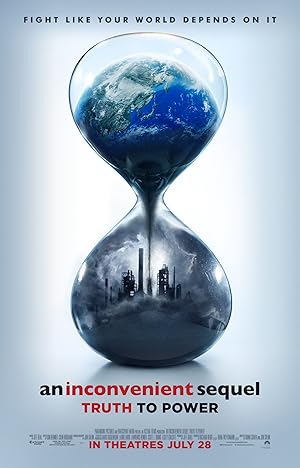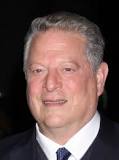
An Inconvenient Sequel: Truth to Power Page #8
where the landline
electricity grids
are not so great.
In Africa.
In the Indian subcontinent.
Now we're seeing this instead:
Solar panels.
This one in Africa's
on the roof of a grass hut.
Parents want their children
to have access
to the universe of information.
Chile. A developing country,
but it has great policy.
You talk about excitement,
this story gets me excited.
At the end of 2013, they had
11 megawatts of solar.
By the end of 2014,
more than 400 megawatts.
By the end of last year,
more than 800 megawatts.
So look at what they have
under construction this year
and under contract to
soon begin construction.
Isn't that great? I love this.
13.3 gigawatts!
and many regions in the world
that are poised
for this kind of breakout.
We are seeing
a real turning here.
On a global basis,
the world gets more energy
from the sun each hour
than the entire global economy
uses for an entire year.
If we increase
the fraction of that
that we harvest
and use productively,
then we can solve that part
of the climate crisis.
There's been a lot of discussion
between India and U.S.
We know that President Obama
did make a call
to Prime Minister Modi.
What the outcomes
were of those talks,
we don't know yet.
What we do know is John Kerry
has been having
repeated discussion.
There was
a one-hour meeting today
with the environment minister.
How all this translates
into India's concerns
being met
still remains to be seen.
Do we have a deal,
Mr. President?
Do we have a deal?
Today is a historic day.
We have,
in the spirit of compromise,
agreed on a number of phrases.
And we have not only
an agreement,
but we have written
a new chapter of hope
in the lives of seven billion
people on the planet.
We hope
that Paris will reassure
this future generation
that we all together
will mitigate
the challenge
posed by climate change,
and we will give them
a better Earth.
Thank you. Merci beaucoup.
L'accord de Paris pour
le climat est accept.
We started
this COP commemorating
those fallen in tragic deaths.
We end this COP celebrating
a new chapter of hope
for the world.
This is exciting.
It's very exciting.
Yes, thank you, sir.
Thank you. I'm glad it helped.
The Paris Agreement
would not have happened
without President Obama,
Secretary of State John Kerry,
President Hollande of France.
Without a lot of people
who worked hard on that.
Virtually every nation
in the entire world agreed
to get to net-zero
greenhouse gas emissions
of this century as possible.
This sends a signal to markets,
sends a signal to investors.
And it resulted
in the largest solar loan
in the history of the world
to help India move forward
more quickly
in its installation of solar.
It needs continuing work.
And one of the reasons
your role is so important
is to hold them to
what they've agreed to
and to keep the pressure on.
Because even with
all the agreements
put together,
it's still not enough.
But the basis is there
to ramp up
and make more progress.
There are cities in the U.S.
that have already
reached the goal of
100% renewable energy.
Rock Port, Missouri.
Greensburg, Kansas.
They were destroyed
by an F5 tornado,
and when they built back,
they say, "Hey",
"let's go 100% renewable,"
and they have.
Right here in Houston,
the home of the global
oil and gas industry,
you'll hear a lot of people say,
"Wind and solar's nice,"
"but it won't really
lead anywhere."
And a lot of people
are now saying
that is a strange new form
of denial.
But look at what's happening
in Georgetown, Texas.
Howdy!
Howdy, Mr. Vice President Gore.
How are you, Mr. Mayor?
Welcome to the greatest city
on Planet Earth.
Spoken like a good mayor.
- Can I have one?
- Oh, sure.
I know they're for kids.
So, how long have you
been mayor?
I have been mayor for two years.
This green energy
initiative started
when I was on council in 2008.
I remember that. Mmm-hmm.
And the direction that
we gave to Chris
and crew was, in 2008, we said
by 2030 we want
our energy portfolio
- to be 30% renewable energy.
- Yeah.
Well, they've sort of
blown by that.
That was ambitious
at that time, anyway.
It was! Absolutely.
Currently we're
90% renewable energy.
We're getting our wind
out of Amarillo.
Our solar farm's being
built out in west Texas.
It should be up and running
next spring.
Oh.
And currently, we will be
the first city in Texas
to be 100% renewable.
And when we go 100% renewable,
we will be the largest city
in the country
that's renewable energy at 100%.
So, I assume that
the reason you did this
is that the two of you are
just rabid environmentalists.
Well, not exactly, because,
um, you're in Georgetown,
which is the reddest city
in the reddest county in Texas,
and I'm a conservative
Republican.
- Yeah.
- Okay.
But our duty to our ratepayers
is to provide them
with the lowest possible
utility cost.
And money talks.
But then, wouldn't it
just make sense
from a common-sense standpoint,
the less stuff you put
in the air, the better it is?
- Yeah.
- I mean, common sense.
You don't need scientists
to debate that.
- Can I use that line?
- You absolutely can.
Hey, let me tell you what.
You would be
the sport of all sports
if somebody could get
a picture of me
and Mr. Vice President?
That's just for
personal use, right?
Oh, yeah.
- All right, here we go.
- Come on.
Here's your camera right there.
Now, this is not an endorsement,
as you can well imagine.
Hi, how are you?
Hi, Beth Wade,
Community Impact newspaper.
Pleasure. Pleasure.
You think this city
can be a trailblazer
for other cities of like size?
Definitely.
Now, not every city has
a CPA as a mayor,
so that's another
advantage for you.
But when other cities
really look at the facts,
I think you're gonna see
a massive wave
switching over to
pollution-free renewable energy.
Well, what we always say is,
don't we have a moral
and ethical obligation
to leave the planet
better than we found it?
You better be careful
talking like that.
T-minus 10, 9, 8,
7, 6, 5,
4, 3, 2, 1,
0.
Liftoff of the Falcon 9.
Falcon 9 has cleared the towers.
The Falcon takes flight,
propelling the Deep Space
Climate Observatory DSCOVR
on a million-mile journey
When President Obama
was elected,
I went to see him and
told him the story of
the DSCOVR satellite and
how it was cancelled.
And he allocated the money,
and it finally got launched.
Second stage engine
ignition
has occurred on time.
Remember, when I
mentioned the Blue Marble,
it was the only photograph
of its kind.
But here's one
from the first week
of last December.
This was taken by a brand-new
NASA and NOAA satellite
called DSCOVR
that orbits the sun
along with the Earth
and the scientists
are learning so much.
Translation
Translate and read this script in other languages:
Select another language:
- - Select -
- 简体中文 (Chinese - Simplified)
- 繁體中文 (Chinese - Traditional)
- Español (Spanish)
- Esperanto (Esperanto)
- 日本語 (Japanese)
- Português (Portuguese)
- Deutsch (German)
- العربية (Arabic)
- Français (French)
- Русский (Russian)
- ಕನ್ನಡ (Kannada)
- 한국어 (Korean)
- עברית (Hebrew)
- Gaeilge (Irish)
- Українська (Ukrainian)
- اردو (Urdu)
- Magyar (Hungarian)
- मानक हिन्दी (Hindi)
- Indonesia (Indonesian)
- Italiano (Italian)
- தமிழ் (Tamil)
- Türkçe (Turkish)
- తెలుగు (Telugu)
- ภาษาไทย (Thai)
- Tiếng Việt (Vietnamese)
- Čeština (Czech)
- Polski (Polish)
- Bahasa Indonesia (Indonesian)
- Românește (Romanian)
- Nederlands (Dutch)
- Ελληνικά (Greek)
- Latinum (Latin)
- Svenska (Swedish)
- Dansk (Danish)
- Suomi (Finnish)
- فارسی (Persian)
- ייִדיש (Yiddish)
- հայերեն (Armenian)
- Norsk (Norwegian)
- English (English)
Citation
Use the citation below to add this screenplay to your bibliography:
Style:MLAChicagoAPA
"An Inconvenient Sequel: Truth to Power" Scripts.com. STANDS4 LLC, 2025. Web. 23 Feb. 2025. <https://www.scripts.com/script/an_inconvenient_sequel:_truth_to_power_2786>.







Discuss this script with the community:
Report Comment
We're doing our best to make sure our content is useful, accurate and safe.
If by any chance you spot an inappropriate comment while navigating through our website please use this form to let us know, and we'll take care of it shortly.
Attachment
You need to be logged in to favorite.
Log In